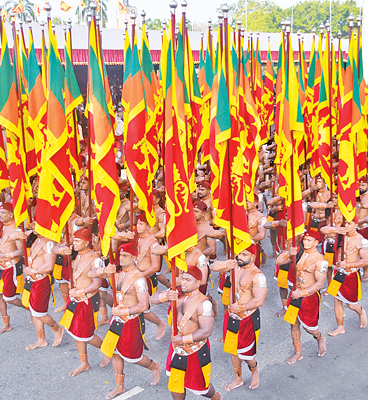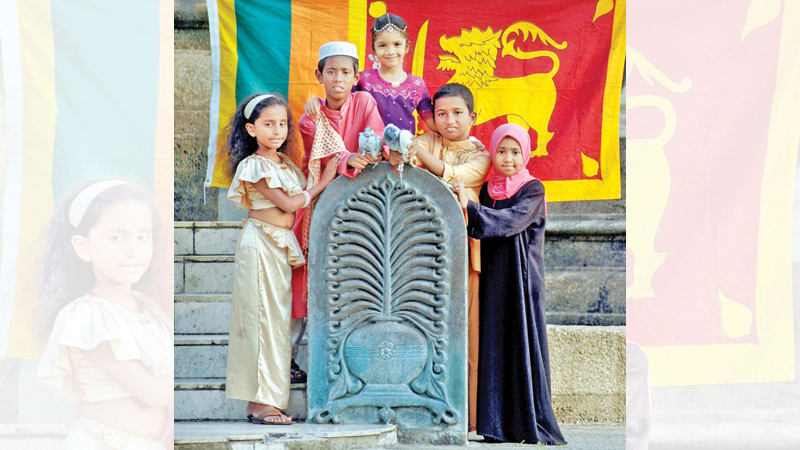
Independence. Liberty. Freedom. Depending on how you look at it, these words can have many interpretations. But it usually means that we are not under anyone, that we are free. It can apply to a person or indeed, to a nation. It is in this context that we will be analysing the word and the concept of Independence.
For thousands of years, following the arrival of Prince Vijaya from India and later, the arrival of Arahat Mahinda with the message of Buddhism, Sri Lanka was an independent nation. Many Kings of yore had to battle invading armies from time to time. They emerged victorious on most occasions, though the seat of power was shifted to various cities such as Anuradhapura, Yapahuwa, Polonnaruwa, Dambadeniya and Kandy, depending on strategic imperatives.
The compact island of Sri Lanka was (and is) strategically placed on the East-West shipping route. Even before world maps came into existence, Sri Lanka was known as a serendipitous island, which earned it the name Serendib.
Trading hub
There is ample archaeological and written evidence that Sri Lanka was reputed as a trading hub for centuries. Though it was not strictly a part of the Silk Route, Sri Lanka was more or less a free port on the East-West trade shipping routes and known for its spices, gems and other goods. The fabled explorers of yesteryear such as Fa Hsien and Ibn Batuta could not find enough superlatives to describe the beauty of the island and its rich cultural and religious legacy.
The 14th, 15th and 16th centuries were a period when even the farthest corners of the world were being discovered by intrepid explorers and the Naval powers of the day – Portuguese, Dutch and somewhat later, the English. Sri Lanka naturally came to their attention due to its strategic location on the world’s crossroads. Although trade was the first objective, colonial ambitions soon took over. The Portuguese were the first to stake a claim to this resplendent isle, in 1505. It was not long before the Dutch came to the scene and the English followed.
By 1815, Sri Lanka was completely and firmly under British rule, a status that would remain until 1948 – just 76 years ago. However, it was only in 1972 that Sri Lanka shed its Dominion status by opting to become a Republic. Sri Lanka has since been followed by many other dominions which have turned into Republics.
 More than 400 years of colonial rule in one form or the other had both good and bad effects on the country and its people. Vestiges of Portuguese and Dutch languages were infused to Sinhala and Tamil, the two vernacular languages. Thus, if you see a signboard announcing a Vendesi in Italy (the word is found in most Western European languages), you know it is an auction or a sale. There are numerous other examples for this enrichment of the vernacular languages, from Istoppuwa to Kamisa. Many people also took on Portuguese and Dutch surnames, which is why one can find so many de Silvas (including this writer), Pereras and Fernandos in this country.
More than 400 years of colonial rule in one form or the other had both good and bad effects on the country and its people. Vestiges of Portuguese and Dutch languages were infused to Sinhala and Tamil, the two vernacular languages. Thus, if you see a signboard announcing a Vendesi in Italy (the word is found in most Western European languages), you know it is an auction or a sale. There are numerous other examples for this enrichment of the vernacular languages, from Istoppuwa to Kamisa. Many people also took on Portuguese and Dutch surnames, which is why one can find so many de Silvas (including this writer), Pereras and Fernandos in this country.
The colonial rulers also propagated their religions here – there are many centuries-old churches that bear testimony to this fact, although certain methods by which they sometimes collected adherents remain controversial to this day. Many elements of our laws are derived from the Dutch and the British.
Impact of British rule
But it was British rule that caused many profound changes, good and bad. English was firmly entrenched as the third language. The British introduced crops such as tea which is still a top foreign exchange earner. Many roads and the railway network were built. They also gave us cricket, a game in which we conquered the world in 1996. Many other infrastructure facilities were initiated. But none of these could suppress the fact that Sri Lankans were denied their freedom and their rightful place in the local society. The locals thus became second class citizens in their own country.
It is the yearning for freedom from colonial rule that led to several rebellions against the British. Although most of these were violently crushed and the heroes executed, it could not extinguish the flame of freedom in the minds of Sri Lankans. By the early part of the 20th Century, the freedom movement was gaining ground rapidly, with many leading religious figures, intellectuals and politicians joining the fray. Developments in neighbouring India too had an effect in this regard. During the Independence struggle, leaders from Sinhala, Tamil, Muslim, Malay and Burgher communities joined hands to achieve one goal – Independence. This was a movement the British could not ignore. The freedom struggle, coupled with geopolitical realities of the day, made Independence inevitable for countries such as Sri Lanka (then known as Ceylon) and India. Thus, on February 4, 1948, Sri Lanka gained Independence from Britain. It was a proud and free nation once more, after more than 400 years of colonial subjugation. There is a notion that post-Independence Sri Lankan Governments have done little to improve the country. On the contrary, vast strides have been made in almost every sphere. The concept of free education and free health has been one pillar of strength to a country that emerged from foreign domination. Thanks to this far-reaching policy, Sri Lanka is almost on par with developed nations in terms of health and education indices.
Vibrant democracy
The country has also remained a steadfast, vibrant democracy unlike several regional neighbours which saw military takeovers although two Southern insurrections challenged its very foundation, not to mention the Northern war. Many programmes have been undertaken to end poverty. Infrastructure development was a priority for most Governments. But the rulers did make serious mistakes.
Perhaps the biggest failure on the part of many post-Independence governments was their inability to protect and nurture the country’s multi-ethnic, multi-religious character.
Polarisation along ethnic lines was to cause a massive conflict later – a conflict that dragged on for 30 long years and drained the country socially and economically. The rancour and discord that plunged the country into despair could have been avoided if the rulers were more pragmatic in their approach to uphold the aspirations of various communities in the country.
Sinhala, Tamil, Muslim or Burgher, we are all equal citizens of this beautiful country – a fact that many chose to ignore, with disastrous consequences. Even after the Northern insurgency ended in 2009, the rulers did little to bring the communities together, engaging in triumphalism instead.
Another factor was the over-reliance on politics. There were many instances where one Government would undo even the good things done by its predecessor, solely due to political reasons. The unilateral cancellation of the Colombo-Malabe Light Rail Transit (LRT) project was one such instance, which even led to the souring of relations with Japan, one of Sri Lanka’s long-standing friends.
New opportunities
Now in peacetime, we have a golden opportunity to put things right on all these counts. Lasting peace and reconciliation must be given priority in this noble exercise. The proposed Office for National Unity and Reconciliation (ONUR) is thus a step in the right direction. While the efforts to resolve the National Question will essentially be a home-grown exercise, it does no harm to look at other countries and models to see what can be done better.
Singapore’s late Prime Minister, Lee Kuan Yew was horrified to see Sri Lanka sliding into an abyss spurred by ethnic divisions, so he ensured priority for ethnic harmony in Singapore. Likewise, South Africa’s post-Apartheid Constitution made certain that everyone, Black or White, could call South Africa their own land.
South Africa’s national anthem has lines in Afrikaans and the many black South Africans who were oppressed by the Afrikaans-speaking White regime for decades have no qualms about singing these lines with hands on their hearts. In India, the national anthem is actually sung in Bengali, a minority language in a country where most people speak Hindi. But here, some misguided elements oppose the National Anthem being sung in Tamil.
The common thread in all of these countries is that the people identify themselves as Singaporean, South African and Indian. They do not think of themselves as Black, White, Caucasian, Chinese, Malay, Hindu, Tamil, Gujarati or Bengali. Achieving this ‘One Nation-One People’ identity should precisely be our goal. Evolving a truly Sri Lankan identity should be one of the main priorities and tasks of the Government which is pursuing unity and reconciliation.
It is perhaps time for us to do away with questions such as, “What is your race and religion” in official documentation. If we call ourselves Sri Lankans instead of giving racial or religious monikers, half of our problems would be solved. We shoulde think of ourselves as one Sri Lankan people. If every Sri Lankan, irrespective of community, can speak Sinhala and Tamil fluently (in addition to English), that is the biggest impetus for peace and reconciliation one can think of. With children in all schools learning both languages, this will be a reality sooner rather than later.
As a nation emerging from the embers of a cataclysmic conflict and a deep economic crisis, we cannot afford to rest on our laurels. Certain recent developments and Covid-19 may have battered our economy and society, but not our innate desire to rise and shine. Seventy-six years after gaining Independence, we are indeed poised on the threshold of an exciting journey into the future. All Sri Lankans must join hands, shedding petty differences, to ensure a bright future for the Pearl of the Indian Ocean.







